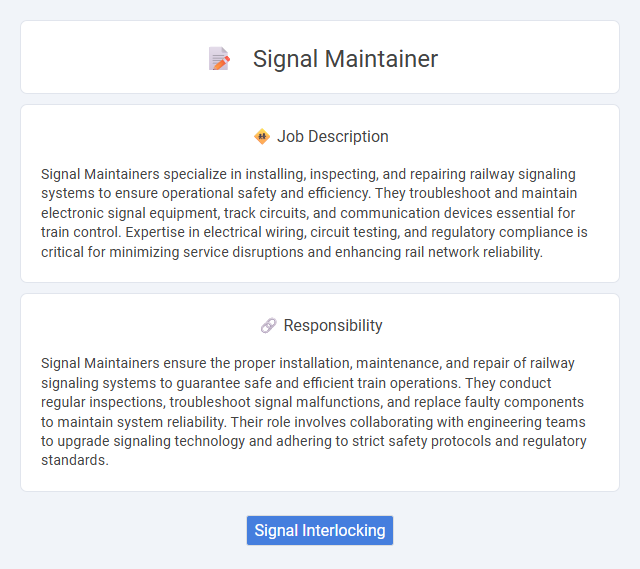
Signal Maintainers specialize in installing, inspecting, and repairing railway signaling systems to ensure operational safety and efficiency. They troubleshoot and maintain electronic signal equipment, track circuits, and communication devices essential for train control. Expertise in electrical wiring, circuit testing, and regulatory compliance is critical for minimizing service disruptions and enhancing rail network reliability.
Individuals with strong attention to detail and good physical stamina are likely suitable for a Signal Maintainer role, given the job's demand for precise technical work and handling of equipment in varied environments. Those who may struggle with irregular hours, high-stress situations, or working in confined spaces might find this position challenging. Overall, a combination of mechanical aptitude and adaptability could increase the probability of success in this occupation.
Qualification
Signal Maintainers require a strong foundation in electrical engineering principles and extensive experience with railway signaling systems. Proficiency in troubleshooting, installing, and maintaining complex signal equipment, including relays, circuits, and communication devices, is essential. Certification in safety protocols and hands-on skills with diagnostic tools enhance effectiveness in ensuring optimal signal operation and railway safety.
Responsibility
Signal Maintainers ensure the proper installation, maintenance, and repair of railway signaling systems to guarantee safe and efficient train operations. They conduct regular inspections, troubleshoot signal malfunctions, and replace faulty components to maintain system reliability. Their role involves collaborating with engineering teams to upgrade signaling technology and adhering to strict safety protocols and regulatory standards.
Benefit
Signal Maintainers probably enjoy competitive salaries and comprehensive benefits packages that may include health insurance, retirement plans, and paid time off. They are likely to have opportunities for career advancement and skill development within the transportation or railway industry. Access to stable employment and a hands-on work environment could also be significant advantages of this role.
Challenge
The role of a Signal Maintainer likely presents challenges related to the complex nature of diagnosing and repairing intricate signaling systems critical for safety and efficiency in rail transport. They probably face high-pressure situations where precise timing and adherence to safety protocols are essential, which increases the difficulty of troubleshooting under tight deadlines. Maintaining up-to-date knowledge of evolving technology and regulatory standards may also be a consistent challenge in this dynamic field.
Career Advancement
Signal Maintainers play a crucial role in ensuring the reliability of railway signaling systems, offering a strong foundation for career growth in the transportation and infrastructure sectors. Gaining expertise in electrical and electronic signaling components can lead to advanced positions such as Signal Supervisor, Systems Engineer, or Infrastructure Manager. Continuous training and certifications in railway signaling technology significantly enhance promotion prospects and salary potential.
Key Terms
Signal Interlocking
Signal Maintainers specializing in Signal Interlocking ensure the safe and efficient operation of railway signaling systems by installing, inspecting, and maintaining interlocking equipment. Their expertise includes troubleshooting relay-based and electronic interlocking systems, coordinating with control centers, and adhering to strict safety standards to prevent signal conflicts. Proficiency in interpreting signaling diagrams and performing routine tests is critical for maintaining the integrity and reliability of railway signal interlocking networks.
 kuljobs.com
kuljobs.com